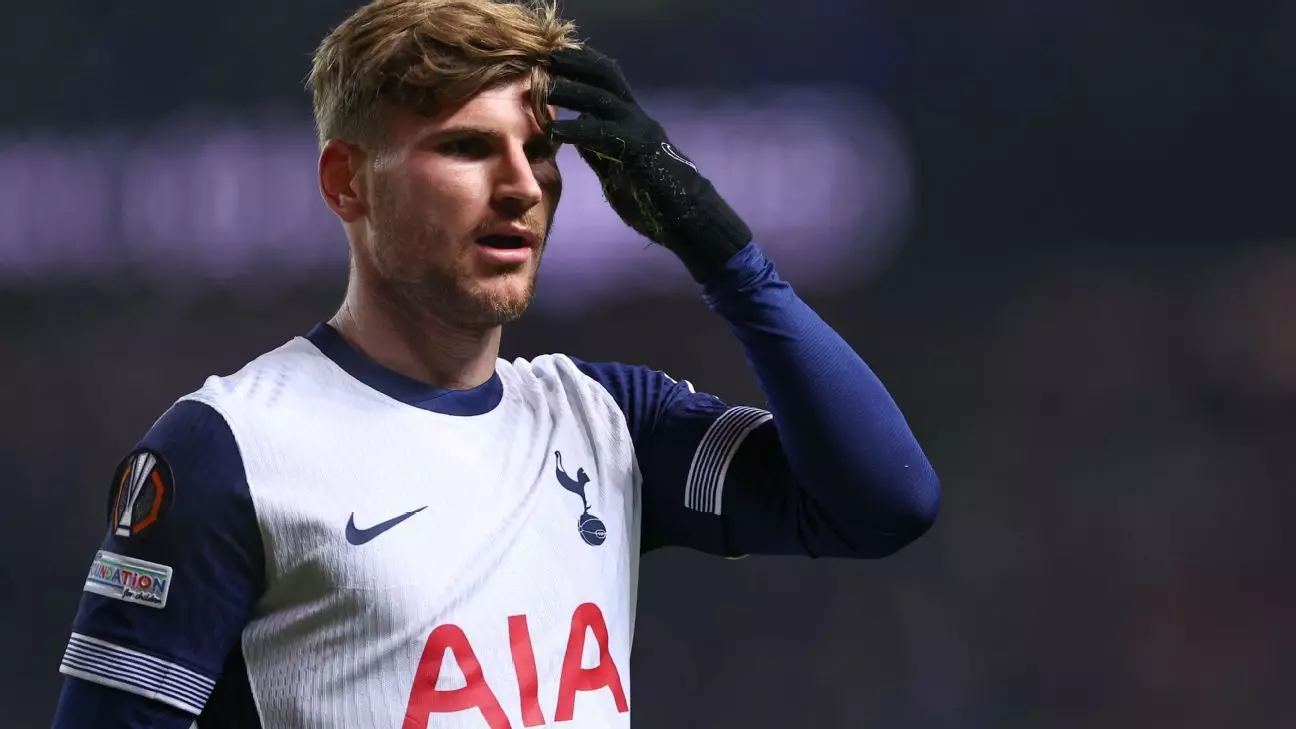Tottenham Hotspur faced off against Rangers in a Europa League clash that ended in a disappointing 1-1 draw. The draw highlighted lingering concerns regarding the team’s performance under head coach Ange Postecoglou, particularly pointing to the underwhelming display of forward Timo Werner. Following the match, Postecoglou did not hold back in his evaluation of Werner’s performance, expressing his frustrations that a seasoned international player was unable to meet expectations, especially in a match that demanded a higher level of commitment.
The coach’s remarks were significant not only for their bluntness but also for their implications regarding the strength and depth of the squad. With the team suffering from numerous injuries, expectations were high for senior players like Werner to step up. However, Postecoglou’s frustration stemmed from his belief that if teenagers like Archie Gray and Lucas Bergvall can contribute meaningfully, experienced players should be doing the same—or better.
The essence of Postecoglou’s critique was accountability. In professional sports, especially within a storied club like Tottenham, the standards are elevated. When asked about the specifics of Werner’s performance, Postecoglou stated that it simply was “not acceptable.” This directness is essential for building a culture of accountability within the team. Senior players must recognize their role as leaders, especially in times of adversity.
Postecoglou’s decision to substitute Werner at halftime instead of waiting until the end of the match sends a clear message about performance expectations. For a team in crisis, such decisions can have a substantial impact on morale and future performances. Remarkably, Postecoglou clarified that his comments were not intended as personal criticism; they were observations aimed at fostering improvement.
Postecoglou emphasized that the current situation demands collective effort from all players, particularly given the injury-depleted roster. In the aftermath of the match, he remarked on the need for senior players to take ownership of their performances. This is crucial, as a successful team often reflects the character and resolve of its leaders. The coach painted a picture of a squad teetering on the edge of crisis, where the efficacy of senior players often dictates the confidence and performance of the younger squad members.
He highlighted a stark reality: with only 15 fit players, and some positions offering limited options, every available player must contribute meaningfully. The urgency is palpable; as the coach stated, “I’m not going to worry about bruised egos.” Essentially, he is calling for input rather than excuses. This drive for performance is critical, especially when the need for results is amplified by the unforgiving nature of league play.
Tottenham’s recent record reflects mounting frustrations with a mere four away victories in the Premier League throughout 2024. The team now stands 11th in the league table and finds themselves seven points off a Champions League spot. Such statistics highlight the urgency for improvement. Addressing why such a talented group struggles on the road is complex; it involves merging tactics with mindset.
Postecoglou’s attacking philosophy is often misconstrued as neglecting defensive responsibilities, but he maintains that the intent is to compete actively and win rather than adopt a defensive posture that seeks merely to avoid defeat. This philosophy requires a significant level of synchronization and shared mentality among players—a factor that seems inconsistent in the current squad. The dichotomy of an attacking intent against the need for defensive solidarity needs continuous refinement.
Tottenham faces a young and struggling Southampton side next, which presents a prime opportunity to gather momentum and regain confidence. The importance of this match cannot be overstated; it is not just about securing three points, but also about affirming the team’s identity and collective resilience. The Spurs must showcase their capability to respond, especially after a match that raised more questions than answers.
The current environment at Tottenham is one fraught with challenges and expectations. Postecoglou is navigating an incredibly tightrope: balancing accountability with development, and fierce ambitions with harsh realities. For the club to achieve its goals, a renewed commitment from all players—particularly its senior contingent—is non-negotiable. As Spurs prepare for their upcoming fixtures, finding that collective spirit will be key to ushering in a brighter chapter.

